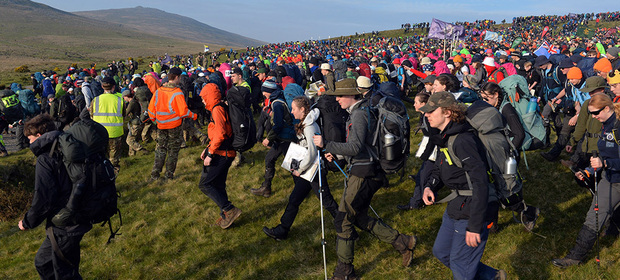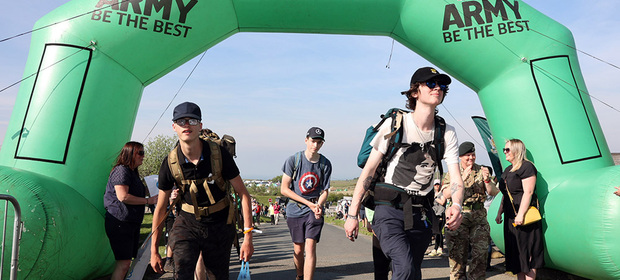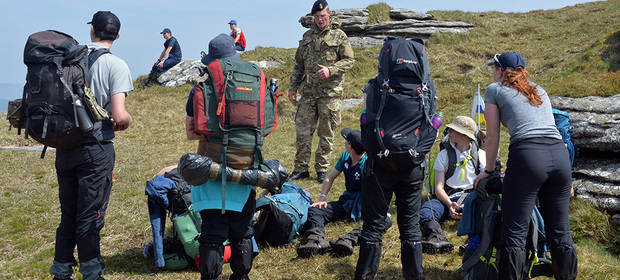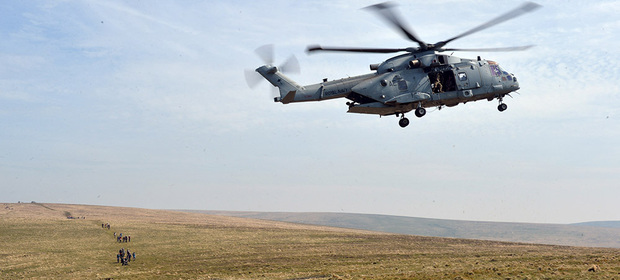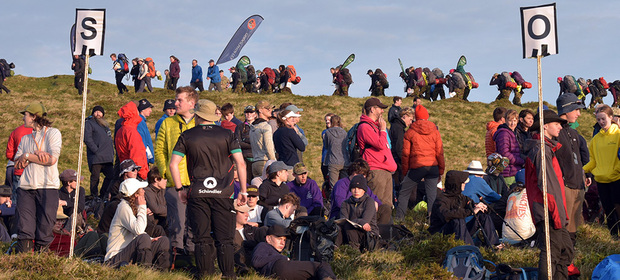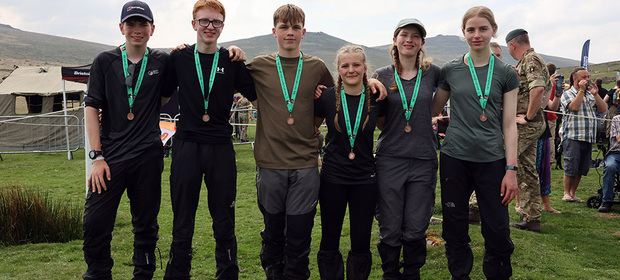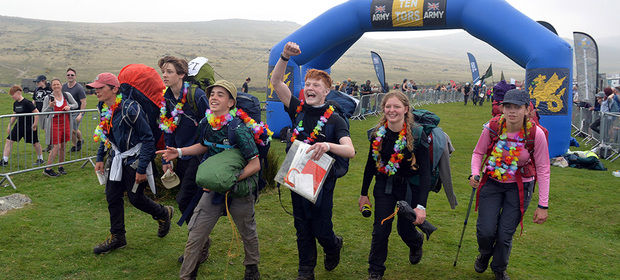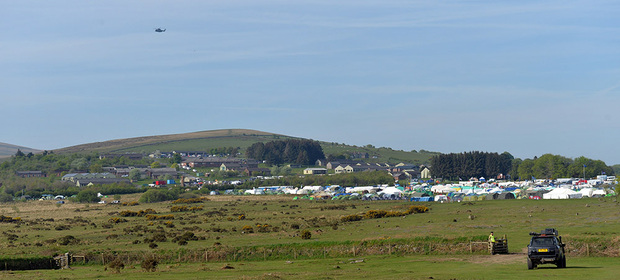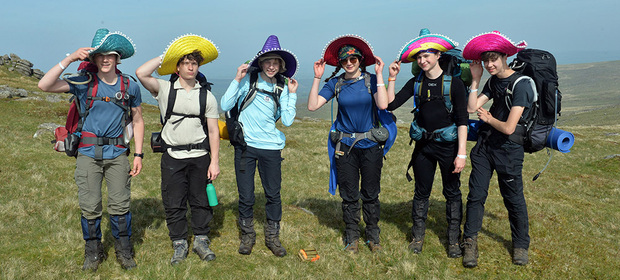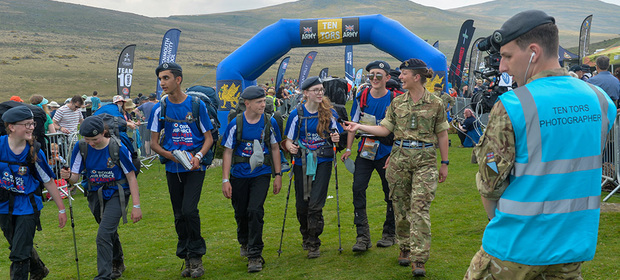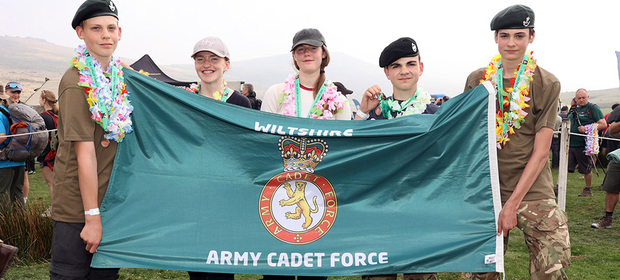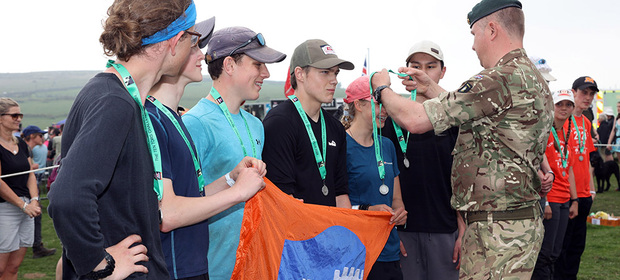The Enablers
Headquarters South West, supported by the Royal Navy and Royal Air Force, works alongside the emergency services, Dartmoor Search and Rescue Group, and many other voluntary organisations and individuals to ensure the safe conduct of the three Challenges. The Ten Tors, Jubilee Challenge and Dartmoor Granite Challenge offers the Army an opportunity to train Regular & Reservists and test command and control procedures, and interoperability with civilian authorities. This is in the context of UK Resilience to support an emergency, such as The Somerset Levels flooding in 2014. The Challenges are also a demonstrable opportunity for the Armed Forces, and particularly the Army, to show its commitment to supporting the local communities throughout the South West through development of young people; this is part of the Armed Force’s Community Covenant. Below are brief introductions on most of the organisations who help make Ten Tors work!
The Headquarters South West Cadet Training Team provide Public Information (PInfo), Ten Tors Challenge Registration, Scrutineering and Safety Briefing. Additional task includes providing a Lost Child RV throughout TT Challenge.
Volunteers from the Royal Navy and the Royal Air Force work as part of the Moor Support Group (MSG), providing the workforce to staff the Safety Control (SC) Points and Basic Control (BC) Points across the Moor and provide team progress reports, oversee night stops and support to those participants unable to continue the Challenge. The Scrutineers, who enforce the Ten Tors Challenge Rules and assist with safety, are also predominantly drawn from current and former members of the Royal Navy and RAF and some Army.
The Commando Helicopter Force, based at Yeovilton, supply the Merlin Helicopters that enable the event and can provide a rescue and casualty evacuation facility.
A number of units and personnel provide the MSG. The MSG monitors and reports on the welfare and progress of all participants throughout their Ten Tors Challenge. The MSG consists of check points on each Tor known as Safety Control (SC) points on the outskirts of the Moor with road access or Basic Controls (BC), with less access by road. Any individual not able to continue, enters the Withdrawal system at a SC and is the responsibility of the MSG until safely reunited with their Team Manager.
6 RIFLES is one of the Rifles' three Reserve Infantry Battalions and is based in Exeter, Devon. It has 450 part-time soldiers from across the South West of England. They work closely with their paired Regular Battalion - 1 RIFLES and provide one quarter of their fighting power on operations. 6 RIFLES are responsible for establishing, managing and administrating Okehampton Camp in support of Ten Tors. The Battalion is actively recruiting and trains predominantly on a Tuesday evening in Army Reserve Centres at the following locations: Exeter, Paignton, Plymouth, Barnstaple (Wed), Gloucester, Bristol, Dorchester and Poole.
165 Port & Maritime Regiment RLC is based across the South of England, with Regimental Headquarters located in Plymouth and sub units in Plymouth, Bodmin, Truro, Southampton, Isle of Wight, Banbury and Aylesbury. Members of the Regiment will be one of the first uniformed military people you are likely to encounter when you arrive at the Ten Tors Camp. They will guide and direct some 5,000 vehicles to their relevant car parks and keep the traffic moving on the narrow access route.
39th Signal Regiment is a reserve unit based in Bristol. Their role is to provide deployable communication assets at high readiness to deploy in support of UK resilience operations. During the Ten Tors event they provide communications and UK operationally experienced Royal Signals soldiers to support the management and coordination of the military support to the Ten Tors event. The Royal Signals soldiers provide IT and radio communications between the operations rooms, support helicopters and check points, whilst utilising the tracking and information management system to maintain situational awareness and track the participants as they move around the moor. 39th Signals Regiment is also supported by 81 Sig Sqn from the 10th Signal Regiment, who provide the fibre optic network around Okehampton Camp which facilitates all the local data communications.
South West Officer Training Regiment (SWOTR) have two key responsiblities over the event. Firstly they run the Start and Finish areas for the event and secondly, run the Jubilee Challenge. The Officer Cadets provide escorts for young people with disabilities, staff check points to track the participants’ progress and are ready to assist in case of problems. The OTR aims to develop the leadership of select undergraduates at Bath, Bristol, Exeter and Plymouth universities through military training, adventurous pursuits, sports and social activities during their 3 years of studies. The Officer Cadets are paid for their attendance at training but does not demand that the students either join the Army, or serve on operations.
Defence Infrastructure Training, Service Delivery Training supported by Landmarc Support Services, manages the Dartmoor Training Area including the camps at Okehampton and Willsworthy. Dartmoor provides the Armed Forces with training areas for live firing, tactical training, and dry training which are essential to our soldiers, sailors and airmen.
Dartmoor Search and Rescue Group (DRG) is a voluntary organisation that provides, Search and Rescue cover across Dartmoor. During the Ten Tors event this is co-ordinated from the operation room in the camp. The Group work closely with all other agencies involved with the event and their first-hand knowledge of the Moor is a crucial part of the Ten Tors safety-net.
Devon and Cornwall 4x4 Response “we never close & we always respond”. The volunteers provide over thirty 4x4 vehicles with drivers to carry the SWOTR, Scrutineers and DRG teams together with Army fall out units for transporting participants who need to leave the route early. Snow, floods and difficult tracks are where we usually operate and in recent years our members covered over 10,000 miles carrying police, nurses, doctors, carers, and essential medical supplies.
Devon and Cornwall Constabulary work closely with the Ten Tors organisers throughout the training period and the Event. Anyone who has been lost or injured on Dartmoor will tell you of their expert coordination of rescue from Dartmoor’s wild country.
The Scrutineers: This group consists in the main of serving and retired members of the Royal Navy and Royal Air Force (and some Army) who support the safety management of the event. They have two key tasks; before the start they check selected teams kit for conformity and during the challenge patrol the Moor in teams to ensure adherence to the rules. The Scrutineers have collectively many years of experience and travel from all over the country to support this unique expedition.

